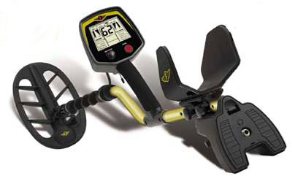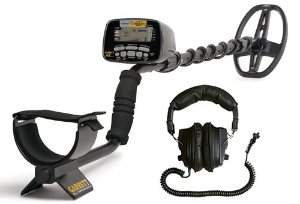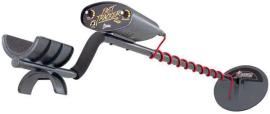What is the best metal detector? This is probably the Number One question that everyone asks when  buying their first detector. No one wants to waste their time and money so they want to know what's "best" right from the start. That's understandable, but unfortunately there is no one single answer. The easiest way to find the "best" detector for YOU is to evaluate YOUR detecting style, YOUR experience level, what items YOU hope to find, and the time that YOU will spend metal detecting. After taking all of these things into consideration, then you will be able to find a metal detector that fits your needs and your budget. To make the purchasing process easier, answer these questions:
buying their first detector. No one wants to waste their time and money so they want to know what's "best" right from the start. That's understandable, but unfortunately there is no one single answer. The easiest way to find the "best" detector for YOU is to evaluate YOUR detecting style, YOUR experience level, what items YOU hope to find, and the time that YOU will spend metal detecting. After taking all of these things into consideration, then you will be able to find a metal detector that fits your needs and your budget. To make the purchasing process easier, answer these questions:
How much do you know about metal detectors? Be honest because the answer also affects your budget. If you're just getting started and plan to go out just a few weekends a year, you may not want to shell out a lot of cash up front so a general all-purpose detector in the $200 range will suit your needs. If you have used a friend's detector a few times and are fairly serious about wanting to find gold and other buried treasures of your own, then buy a detector in the $700 range that is user-friendly. You will get a very good quality machine with plenty of bells and whistles, yet it won't require an advanced degree to actually use it. And you won't have to spend hours reading the owners' manual to understand it either. Before investing in a model that costs thousands of dollars, first be sure you love detecting and will use it often enough to justify the big price tag no matter what brand you decide on. Garrett and Fisher are two of the oldest manufacturers in the business.
 Where do you plan to detect? Deserts, rivers, parks, and saltwater beaches all have very different ground conditions. If you prefer to be in deep water, you'll want a submersible detector. If you plan to hunt around the shoreline, then you don't have to worry about the entire detector being waterproof, just the coil. If you will be in city parks and other areas where overhead power lines are the norm, then a very low frequency (VLF) detector will be your best bet. If you plan to hunt mostly in heavily mineralized areas, consider a pulse induction (PI) machine for best results. Keep in mind that just changing the search coil on your metal detector can be the next best thing to buying a whole new machine without spending a lot of money! Most metal detectors come with a standard search coil that is good for general use – finding the broadest range of targets in the broadest range of environments. But search coils come in all shapes and sizes, and it's possible that merely changing the coil on your detector will lead you to a host of new targets.
Where do you plan to detect? Deserts, rivers, parks, and saltwater beaches all have very different ground conditions. If you prefer to be in deep water, you'll want a submersible detector. If you plan to hunt around the shoreline, then you don't have to worry about the entire detector being waterproof, just the coil. If you will be in city parks and other areas where overhead power lines are the norm, then a very low frequency (VLF) detector will be your best bet. If you plan to hunt mostly in heavily mineralized areas, consider a pulse induction (PI) machine for best results. Keep in mind that just changing the search coil on your metal detector can be the next best thing to buying a whole new machine without spending a lot of money! Most metal detectors come with a standard search coil that is good for general use – finding the broadest range of targets in the broadest range of environments. But search coils come in all shapes and sizes, and it's possible that merely changing the coil on your detector will lead you to a host of new targets.
What do you primarily hope to find? If you want to find gold, you'll need a detector especially made for that purpose. Gold detectors are not necessarily more expensive, but they are built with a higher sensitivity to detecting gold nuggets, and have better ground balancing and discrimination abilities. PI machines aren't so good for coin shooting in urban areas where you are likely to encounter iron trash, however, they are ideal for beaches or detecting in other highly mineralized soils, especially if you are looking for objects that are deeply buried. VLF detectors are more sensitive to finding the smallest bits of gold, but do not as easily cancel out ground mineralization.
 Metal detecting is one of the easiest, most profitable, and fun ways to find gold and other metallic treasures such as coins, jewelry, and relics. It's so easy to have your metal detector ready to go in its carry bag with extra coils, a digger or scoop, headphones, and spare batteries. Just grab and go! There are many thousands of passionate detectorists around the world already enjoying the rewarding outdoor activity of metal detecting. If you want to join their ranks, please keep the following in mind:
Metal detecting is one of the easiest, most profitable, and fun ways to find gold and other metallic treasures such as coins, jewelry, and relics. It's so easy to have your metal detector ready to go in its carry bag with extra coils, a digger or scoop, headphones, and spare batteries. Just grab and go! There are many thousands of passionate detectorists around the world already enjoying the rewarding outdoor activity of metal detecting. If you want to join their ranks, please keep the following in mind:
Metal Detectorist Code of Ethics
- Always check federal, state, county and local laws before using your metal detector. It is your responsibility to “know the law.”
- Abide by all laws, ordinances or regulations that may govern metal detecting in the area you will be in.
- Never trespass. Always obtain permission prior to entering private property, mineral claims, or underwater salvage leases.
- Do not damage, deface, destroy, or vandalize any property (including: ghost towns and deserted structures), and never tamper with any equipment at the site.
- Never litter. Always pack out what you take in, and remove all trash your metal detector uncovers during your search.
- Fill all holes, regardless how remote the location, and never dig in a way that will damage, be damaging to, or kill any vegetation.
- Do not build fires, camp or park in non-designated or restricted areas.
- Leave all gates and other accesses to land as found.
- Never contaminate wells, creeks, or any other water supplies.
- Be courteous, considerate, and thoughtful at all times when metal detecting.
- Report the discovery of any items of historic significance you find with your metal detector to the local historical society or proper authorities.
- Uphold all finders, search and salvage agreements.
- Promote responsible historical research and artifact recovery, and the sharing of knowledge with others.








